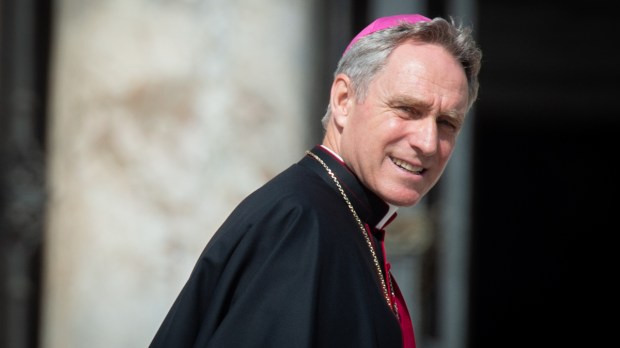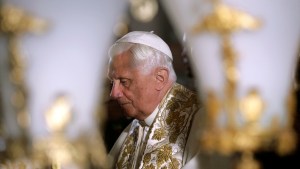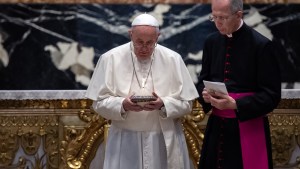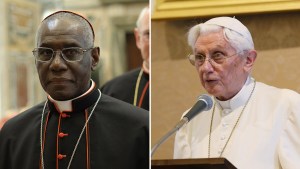On January 9, 2023, Pope Francis met privately with Archbishop Georg Gänswein, Joseph Ratzinger/Benedict XVI’s secretary from 2003 until his death. The meeting’s contents were not revealed; however. it took place just a couple of days before the release of Archbishop Gänswein’s memoir, Nothing but the Truth, My Life at the Side of Benedict XVI (Piemme Editions, published in Italian on January 12), which at times casts a very critical eye on the Argentinian Pope’s pontificate.
I.MEDIA, which obtained the manuscript prior to publication, reports on the main revelations.
The 336-page book was written with Italian journalist Saverio Gaeta, a Vatican expert who also specializes in the history of the controversial Marian shrine of Medjugorje in Bosnia-Herzegovina. The manuscript, which was shared with the press even before Benedict XVI had been buried, presents itself in the preface as a defense of a Pontiff, “too often denigrated by the narrative of the media and of the detractors.”
The book tells of the behind-the-scenes life in the Holy See from when Cardinal Joseph Ratzinger headed the Congregation of the Doctrine of the Faith, to his last years as Pope Emeritus within the quiet walls of the Vatican’s Mater Ecclesiae Monastery.
Archbishop Gänswein tells the rich story of the 265th pontiff with numerous anecdotes, which range from sweet and amusing moments, to looking at length at the difficulties Benedict XVI faced as pope — such as, for example, during the Vatileaks affair, where confidential papal documents were leaked to the press. Archbishop Gänswein explains that the pontiff’s butler, Paolo Gabriele, had stolen them from his (the archbishop’s) personal desk. The book also recounts the delicate months leading up to the renunciation and provides some details on Pope Francis’ arrival at the Vatican.
A big brother, rather than a grandfather
There are many lighthearted and captivating moments described in the book, which illustrate the Pope Emeritus’ personality and interests. For example during the 2005 conclave Archbishop Gänswein explains Cardinal Ratzinger put on a black sweater, as he had felt cold in the Sistine Chapel. When the new pope went to the Loggia of St Peter’s Basilica for the Habemus Papam, Archbishop Gänswein realized he had forgotten to take off the sweater; the black sleeves were conspicuous under his vestments that were a little too small.
Another example is Benedict XVI’s amused reaction when he learned that Francis on a few occasions referred to him living in the Vatican as like having a “wise grandfather at home.”
“Well, after all, we are only nine years apart. Perhaps it would be more correct to call me ‘big brother,’” the Pope Emeritus had joked.
Archbishop Gänswein also described how Benedict XVI would spend his Sundays when he was pope. “We sometimes watched period dramas (but he also liked episodes of Don Matteo [a famous Italian TV show about a priest who helps solve crimes in his town], or listened to classical music (especially Mozart, Bach, and Beethoven),” Gänswein writes. “Sometimes [Benedict XVI] played the piano himself (Schubert and Mozart were among the most frequently used scores).”
The black sheep
An entire chapter of the book is devoted to the relationship between Francis and Benedict XVI and Gänswein does not hesitate to claim that there were some tensions that may have arisen. It’s notable however, that in Gänswein’s telling, certain difficulties seem to be his (the archbishop’s) rather than those of the Pope Emeritus.
What he also makes clear is that Catholics themselves were at the heart of some of the struggles. According to him, the problem was not so much “the coexistence of two popes, one reigning and one emeritus, as the emergence and development of two groups of fans.”
In particular, he confided that some “‘black sheep'” tried “to pull Benedict XVI ‘by the cassock'” in order to “foment confusion and rebellion” or to serve their personal ambitions.
“Padre Georg,” as he has been nicknamed, also strongly emphasized the dialogue that existed between the two pontiffs. He for example cited large excerpts of an unpublished critical note that Benedict XVI wrote to Francis — at the latter’s request — concerning an interview the Argentinian pontiff had done with the Jesuit monthly La Civiltà Cattolica in 2013. Benedict XVI replied that he read “the text with joy and with true spiritual gain” and agreed with Francis but wanted to complement his answers on two thorny issues addressed. The first was abortion, where the Pope Emeritus recalled the pro-life line defended by John Paul II, and the second was homosexuality, where he criticized the “public propaganda” on the “philosophy of gender.”
The “error” of Traditionis custodes
In one of the final chapters, dedicated to the last years at the Mater Ecclesiae Monastery, Archbishop Gänswein reports that Benedict XVI considered the 2020 Motu Proprio Traditionis custodes, with which Pope Francis canceled the provisions Benedict had made to liberalize the Tridentine Mass, to be an “error.”
Similar to how Francis and Benedict were made tokens of opposing sides, with this measure, Archbishop Gänswein says, the liturgy could become “a battleground for opposing sides, in particular making the Latin celebration the bulwark to be defended or the bastion to be knocked down.”
According to his secretary, Benedict XVI wondered what the justifications were for such a measure. In particular, he questioned why the results of the investigation conducted by the Dicastery for the Doctrine of the Faith on the effects in the dioceses of his Motu Proprio Summorum pontificum (2007) had not been published. He also reportedly did not appreciate Pope Francis’ mention of his own name to justify this liturgical reform.
When Archbishop Gänswein asked Benedict XVI what he thought of Francis’ Motu Proprio he nonetheless acknowledged that “the reigning pontiff has the responsibility for decisions such as this and must act according to what he considers to be the good of the Church.”
The book controversy
Gänswein’s book also mentions the controversy that emerged after the release in early 2020 of the original French version of the book From the Depths of Our Hearts: Priesthood, Celibacy and the Crisis of the Catholic Church, originally co-signed by Cardinal Robert Sarah and Benedict XVI. Some had perceived the publication as an attempt to influence Pope Francis on the issue of priestly celibacy, as this question had been discussed and submitted to the pontiff during the Synod on the Amazon, which had just occurred in late 2019. When the book came out in January 2020 the post-synodal exhortation Querida Amazonia had still not been published.
Archbishop Gänswein denies having been aware of the details of how the volume would be presented and described himself as the victim of Cardinal Sarah’s editor, Nicolas Diat – who, at the time, had assured that he had duly informed the secretary of the nature of the project.
The German secretary also highlights that Benedict XVI wrote a letter to Pope Francis to explain himself and expressed his “sadness about the abuse of [his] article in the public discussion.”




